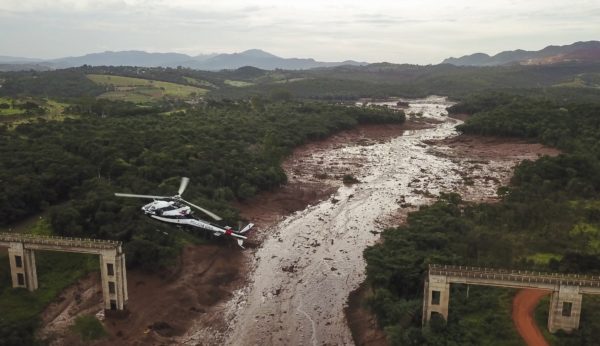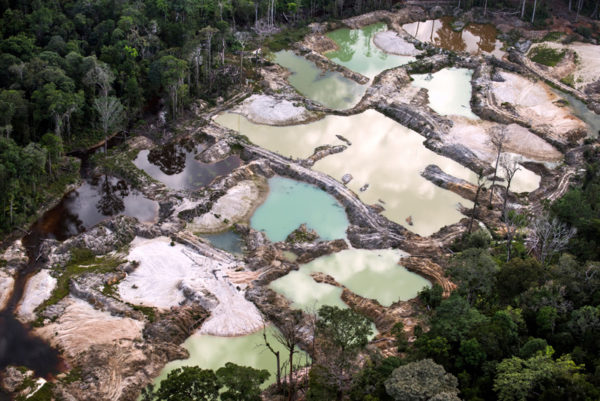Mining director in Brazil plans ‘regulatory guillotine’
Remarks come amid attempts by President Jair Bolsonaro to open up indigenous lands to mining and agribusiness interests

The director of Brazil’s National Mining Agency (ANM), plans to take a “regulatory guillotine” to the mining sector – raising new fears about protections for indigenous communities and the threat of deforestation.
The unreported comments, made at a mining conference last month, come as the agency promotes a new “partnership” with the Organisation for Economic Cooperation and Development (OECD) to develop its regulatory framework. The OECD confirmed to Unearthed it is producing a report for the ANM.
The news follows a concerted push by President Jair Bolsonaro’s administration to open up indigenous lands – often located in forested regions – to mining. A bill to sweep away regulations is currently stalled in parliament.
Deforestation in the Amazon is soaring, stimulated by Bolsonaro’s policies and rhetoric in support of miners, ranchers and land-grabbers, while environmental protection agencies have been systematically undermined and are hamstrung by the pandemic and budgetary cuts.
“If the ‘regulatory guillotine’ includes environmental protection standards, expect disasters involving mining developments ahead,” Suely Araújo, senior public policy specialist at the Climate Observatory and former president of Ibama, Brazil’s federal environmental protection agency, told Unearthed.
“By reducing their obligations in this field, they will place the burden of environmental degradation on society, which is unacceptable,” Araújo added.
At the mining conference, held in May, ANM director Tomás Albuquerque said the partnership with the OECD would allow them to eliminate “obstacles” currently facing the sector.
“All this [red tape] is what we are going to suppress, the legislation we will repeal, we will be able to do this with the instrument that we call the regulatory guillotine. Simply cut, unclog and move forward,” said Albuquerque at a conference promoted by FFA Legal, a private consultancy that works with mining companies.

According to a document obtained through a Freedom of Information request, the ANM will pay the OECD 385 thousand euros, or about R$2 million reais to “identify regulatory barriers, obstacles, implementation failures or inefficiencies that affect the dynamics of the mining sector in Brazil.”
But comments will raise concerns the partnership will do nothing to improve environmental and social protections – and could instead be used by the regulator to justify the removal of environmental and indigenous protections.
“Any improvement in management, governance…all this is appropriate, but you need to do it not in the sense of destruction but of improvement” Izabella Teixeira, Minister of the Environment during the administration of Dilma Rousseff, told Unearthed.
“We need to work in more environmental safeguards for protection, prevention not only in relation to environmental crimes but also as regards crimes of responsibility,” she said.
The ANM declined to comment.
Deregulation reaches indigenous lands
The calls for deregulation pose a particular risk to indigenous lands and come amid a legislative attempt by Bolsonaro to make good on one of his key campaign promises to open up indigenous lands for mining, hydroelectric dams, and agribusiness. The bill is currently stalled in parliament.
According to data from NGO Instituto Socioambiental (ISA) and ANM, 3,773 requests have been submitted for mining-related activities on 31 indigenous reserves and 17 protected areas in Brazil.

Some of the largest mining companies in the world, such as Brazil’s Vale, Canada’s Belo Sun and Britain’s Anglo American, have submitted applications for mineral research that would affect indigenous lands in the Amazon, including projects in areas close to acutely vulnerable isolated indigenous people. Some of the applications date from the 1990s and have since been withdrawn, but others were made as recently as 2017 to 2019, Mongabay reported.
“The pressure of the agro-extractive-mining fronts on the indigenous territories is never-ending,” Antenor Vaz, former Funai employee and leading authority on isolated tribes in the Brazilian Amazon, told Unearthed.
“It is a steamroller on the rights of indigenous and traditional peoples,” he said of the stalled bill.
A treasure chest to be opened
With legislation stalled, Brazil has continued touting its desire to attract more foreign mining interests. Even without legislation, the regulator has said it wants to make as many as 20,000 new areas available for exploration.
Undeterred by the COVID-19 pandemic, representatives of the Bolsonaro government attended a major international mining conference in Toronto and offered a series of guarantees to investors. Mining lobbyists have been received frequently in Brasília at the Ministry of Mines and Energy.
The partnership between ANM and the OECD was announced at the Toronto conference. In an official publication released at the time the mining agency claimed “Brazil stands out as a country still very much open for exploration opportunities and waiting for the treasure chest to be opened.”
Contacted for comment, the OECD said:
“The OECD has agreed to prepare a report for the National Mining Agency of Brazil (ANM) that will provide an assessment of the regulatory framework that guides the mining sector in Brazil and recommendations for improving the quality of regulation to benefit Brazilian society at large. The work will identify gaps, overlaps and inefficiencies in areas such as the granting of licenses and permits to exploit minerals; safety and hygiene at the workplace; and environmental protection.”

